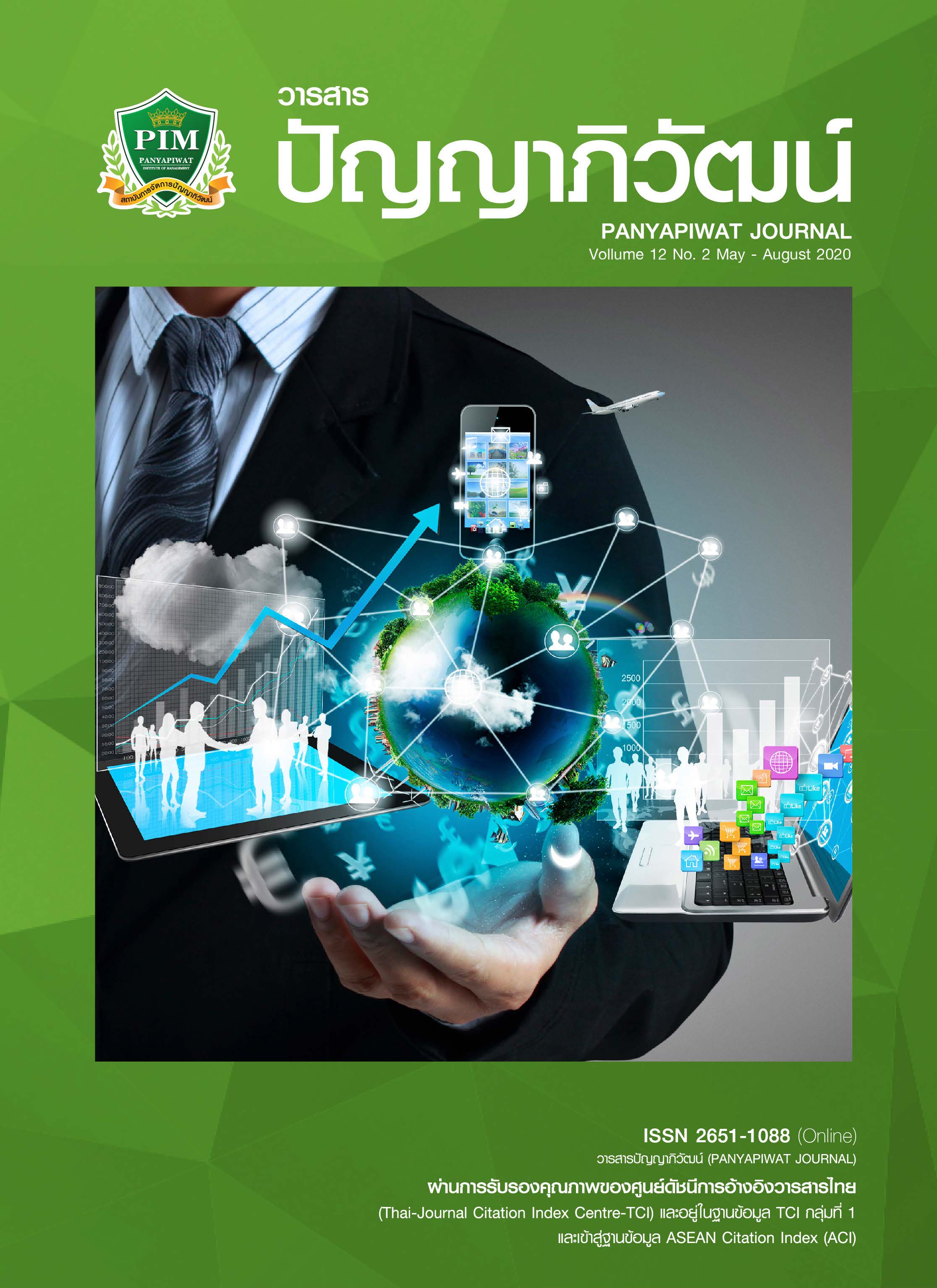ปัจจัยคัดสรรที่ส่งผลต่อประสิทธิภาพการบริหารงานวิชาการ ตามนโยบายลดเวลาเรียน เพิ่มเวลารู้ของผู้บริหารสถานศึกษา สังกัดสำนักงานเขตพื้นที่การศึกษามัธยมศึกษา เขต 3
Main Article Content
บทคัดย่อ
การวิจัยครั้งนี้มีวัตถุประสงค์เพื่อศึกษา (1) ปัจจัยคัดสรรที่เกี่ยวข้องกับประสิทธิภาพการบริหารงานวิชาการตามนโยบายลดเวลาเรียน เพิ่มเวลารู้ของผู้บริหารสถานศึกษา สังกัดสำนักงานเขตพื้นที่การศึกษามัธยมศึกษา เขต 3 (2) ประสิทธิภาพการบริหารงานวิชาการตามนโยบายลดเวลาเรียน เพิ่มเวลารู้ของผู้บริหารสถานศึกษา (3) ความสัมพันธ์ระหว่างปัจจัยคัดสรรกับประสิทธิภาพการบริหารงานวิชาการตามนโยบายลดเวลาเรียน เพิ่มเวลารู้ของผู้บริหารสถานศึกษา และ (4) ปัจจัยคัดสรรที่ส่งผลต่อประสิทธิภาพการบริหารงานวิชาการตามนโยบายลดเวลาเรียน เพิ่มเวลารู้ของผู้บริหารสถานศึกษา
กลุ่มตัวอย่าง คือ ครู จำนวน 338 คน จากสถานศึกษาระดับมัธยมศึกษา สังกัดสำนักงานเขตพื้นที่การศึกษามัธยมศึกษา เขต 3 โดยใช้การสุ่มแบบแบ่งชั้น เครื่องมือวิจัยเป็นแบบสอบถามชนิดมาตรประมาณค่า ซึ่งประกอบด้วยข้อมูลสมรรถนะองค์กร การส่งเสริมสนับสนุนด้านทรัพยากร คุณภาพนโยบาย ความร่วมมือของเครือข่ายสถานศึกษา และประสิทธิภาพการบริหารงานวิชาการตามนโยบายลดเวลาเรียน เพิ่มเวลารู้ ซึ่งมีค่าความเที่ยงเท่ากับ 0.94, 0.96, 0.96, 0.95 และ 0.98 ตามลำดับ สถิติที่ใช้ในการวิเคราะห์ ได้แก่ ความถี่ ค่าร้อยละ ค่าเฉลี่ย ส่วนเบี่ยงเบนมาตรฐาน ค่าสัมประสิทธิ์สหสัมพันธ์แบบเพียร์สันและการวิเคราะห์ความถดถอยพหุแบบขั้นตอน
ผลการวิจัยปรากฏว่า (1) ปัจจัยคัดสรรในภาพรวมและทุกปัจจัยอยู่ในระดับมาก (2) ประสิทธิภาพการบริหารงานวิชาการตามนโยบายลดเวลาเรียน เพิ่มเวลารู้ ในภาพรวมและทุกด้านอยู่ในระดับมาก (3) ปัจจัยคัดสรรทุกปัจจัยมีความสัมพันธ์ทางบวกกับประสิทธิภาพการบริหารงานวิชาการตามนโยบายลดเวลาเรียน เพิ่มเวลารู้ และ (4) ปัจจัยที่ส่งผลอย่างมีนัยสำคัญต่อประสิทธิภาพการบริหารงานวิชาการตามนโยบายลดเวลาเรียน เพิ่มเวลารู้ของผู้บริหารสถานศึกษามีสามปัจจัย เรียงตามลำดับ ได้แก่ สมรรถนะองค์กร ความร่วมมือของเครือข่ายสถานศึกษา และการส่งเสริมสนับสนุนด้านทรัพยากร โดยทั้ง 3 ปัจจัยร่วมกันทำนายประสิทธิภาพการบริหารงานวิชาการตามนโยบายลดเวลาเรียน เพิ่มเวลารู้ได้ร้อยละ 83
Article Details
“ข้าพเจ้าและผู้เขียนร่วม (ถ้ามี) ขอรับรองว่า บทความที่เสนอมานี้ยังไม่เคยได้รับการตีพิมพ์และไม่ได้อยู่ระหว่างกระบวนการพิจารณาลงตีพิมพ์ในวารสารหรือแหล่งเผยแพร่อื่นใด ข้าพเจ้าและผู้เขียนร่วมยอมรับหลักเกณฑ์การพิจารณาต้นฉบับ ทั้งยินยอมให้กองบรรณาธิการมีสิทธิ์พิจารณาและตรวจแก้ต้นฉบับได้ตามที่เห็นสมควร พร้อมนี้ขอมอบลิขสิทธิ์บทความที่ได้รับการตีพิมพ์ให้แก่สถาบันการจัดการปัญญาภิวัฒน์หากมีการฟ้องร้องเรื่องการละเมิดลิขสิทธิ์เกี่ยวกับภาพ กราฟ ข้อความส่วนใดส่วนหนึ่งและ/หรือข้อคิดเห็นที่ปรากฏในบทความข้าพเจ้าและผู้เขียนร่วมยินยอมรับผิดชอบแต่เพียงฝ่ายเดียว”
เอกสารอ้างอิง
Agam, I. (2014). Factors affecting the academic administration effectiveness of Islamic Private Schools in Satun Province. (Master thesis unpublished). Songkhla Rajabhat University, Songkhla. [in Thai]
Angganapattarakajorn, V. (2012). Application of Teach Less, Learn More to Learning Management in Mathematics Classroom. Journal of Education, 23(1), 1-11. [in Thai]
Chantarasorn, W. (2011). The theory of applying the public policies to action (5th ed.). Bangkok: Prik Wan Graphic Company Limited. [in Thai]
Hakaew, S. (2013). Factors affecting the academic administration effectiveness of schools under Khon Kaen Primary Educational Service Area Office 3. Master of Education Program in Educational Administration, Mahasarakham University. [in Thai]
Manongprasong, S. (2016). Management of “Moderate Class, More Knowledge” activities of Phitsanulok Kindergarten School. Administrative Leadership Development Program. Teacher Development Institute, Faculty and educational persons, Nakhon Pathom. [in Thai]
Nuengchalerm, P. (2016). Moderate class, more knowledge: Policy towards theory and action. Praewa Kalasin Academic Journal Kalasin University, 3(1), 137-146. [in Thai]
Office of the Basic Education Commission. (2016). Guidelines for Supervision of Learning Activities for Development 4H. Bangkok: Veterans Organization of The Press. [In Thai]
_____. (2016). The Manual of Time Management “Moderate Class, More Knowledge”. Bangkok: Organization of Delivery of Goods and Parcels. [in Thai]
_____. (2014). Thai education situations in the world forum 2014. Bangkok: Prik Wan Graphic Company Limited. [in Thai]
_____. (2012). Research report on policies and strategies for educational quality development of international countries Members. Bangkok: Prik Wan Graphic Company Limited. [in Thai]
Office of the Education Council. (2009). Global quality system How to enter primary quality schools. Bangkok: Prik Wan Graphic Company Limited. [in Thai]
Ritcharoon, P. (2011). Social Science Research Methodology (5th ed.). Bangkok: House of kermyst. [in Thai]
Thongkow, K. (2005). Applying Educational Policies and Plans to Action: Concepts, Theories and Guidelines for Action. Nonthaburi: Sukhothai Thammathirat University. [in Thai]
Wahachat, R. (2007). Academic administration for basic education schools. Songkhla: Thaksin University Book Center. [in Thai]
Wongcharoen, B. & Tiacharoen, S. (2018). The administration of “moderate class more knowledge” in Bansuanluang (Rattanawichit Phitayakhan) School. Journal of Educational Administration Silpakorn University, 9(1), 1-114. [in Thai]


